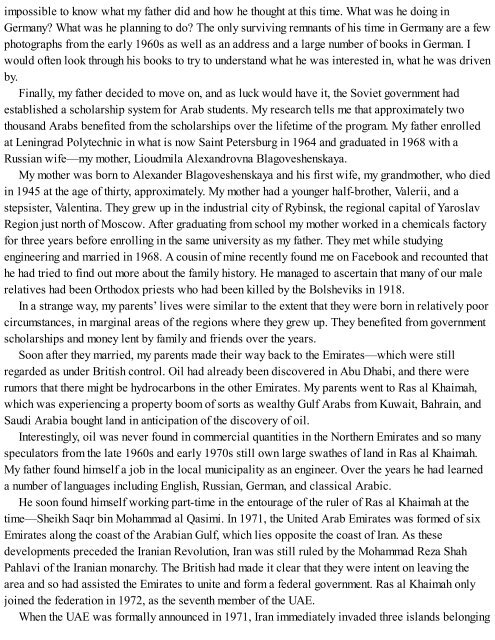1250119847
Create successful ePaper yourself
Turn your PDF publications into a flip-book with our unique Google optimized e-Paper software.
impossible to know what my father did and how he thought at this time. What was he doing in<br />
Germany? What was he planning to do? The only surviving remnants of his time in Germany are a few<br />
photographs from the early 1960s as well as an address and a large number of books in German. I<br />
would often look through his books to try to understand what he was interested in, what he was driven<br />
by.<br />
Finally, my father decided to move on, and as luck would have it, the Soviet government had<br />
established a scholarship system for Arab students. My research tells me that approximately two<br />
thousand Arabs benefited from the scholarships over the lifetime of the program. My father enrolled<br />
at Leningrad Polytechnic in what is now Saint Petersburg in 1964 and graduated in 1968 with a<br />
Russian wife—my mother, Lioudmila Alexandrovna Blagoveshenskaya.<br />
My mother was born to Alexander Blagoveshenskaya and his first wife, my grandmother, who died<br />
in 1945 at the age of thirty, approximately. My mother had a younger half-brother, Valerii, and a<br />
stepsister, Valentina. They grew up in the industrial city of Rybinsk, the regional capital of Yaroslav<br />
Region just north of Moscow. After graduating from school my mother worked in a chemicals factory<br />
for three years before enrolling in the same university as my father. They met while studying<br />
engineering and married in 1968. A cousin of mine recently found me on Facebook and recounted that<br />
he had tried to find out more about the family history. He managed to ascertain that many of our male<br />
relatives had been Orthodox priests who had been killed by the Bolsheviks in 1918.<br />
In a strange way, my parents’ lives were similar to the extent that they were born in relatively poor<br />
circumstances, in marginal areas of the regions where they grew up. They benefited from government<br />
scholarships and money lent by family and friends over the years.<br />
Soon after they married, my parents made their way back to the Emirates—which were still<br />
regarded as under British control. Oil had already been discovered in Abu Dhabi, and there were<br />
rumors that there might be hydrocarbons in the other Emirates. My parents went to Ras al Khaimah,<br />
which was experiencing a property boom of sorts as wealthy Gulf Arabs from Kuwait, Bahrain, and<br />
Saudi Arabia bought land in anticipation of the discovery of oil.<br />
Interestingly, oil was never found in commercial quantities in the Northern Emirates and so many<br />
speculators from the late 1960s and early 1970s still own large swathes of land in Ras al Khaimah.<br />
My father found himself a job in the local municipality as an engineer. Over the years he had learned<br />
a number of languages including English, Russian, German, and classical Arabic.<br />
He soon found himself working part-time in the entourage of the ruler of Ras al Khaimah at the<br />
time—Sheikh Saqr bin Mohammad al Qasimi. In 1971, the United Arab Emirates was formed of six<br />
Emirates along the coast of the Arabian Gulf, which lies opposite the coast of Iran. As these<br />
developments preceded the Iranian Revolution, Iran was still ruled by the Mohammad Reza Shah<br />
Pahlavi of the Iranian monarchy. The British had made it clear that they were intent on leaving the<br />
area and so had assisted the Emirates to unite and form a federal government. Ras al Khaimah only<br />
joined the federation in 1972, as the seventh member of the UAE.<br />
When the UAE was formally announced in 1971, Iran immediately invaded three islands belonging
















